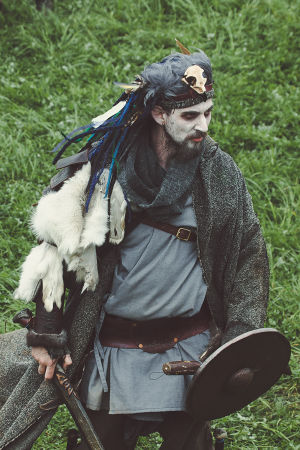Wintermark religious beliefs
The priests of Wintermark provide spiritual and moral guidance through the tales of the greatest heroes of the past. Called stormcrows, they wear the traditional Kallavesi feathers and a black or grey tattered and layered robe. The stormcrows compose and recite verses which recount the feats of the Paragons and other heroes.
A stormcrow provides the moral centre of every hall, pushing them to perform the deeds their souls long to achieve and to live up to the legacy of the heroes who have gone before. Their duties are often very serious, but many also strive to be the heart of the community, providing cheer through the dark winter nights and reminding their fellows of the joys of being alive. A stormcrow might find themselves preaching the need to laugh in the face of death, conducting grand and glorious death rites, or testing their congregation with riddles. Their preaching, rites and riddles often refer to the birds sacred to the Winterfolk. Whatever form religious observance takes, it usually ends with music, laughter and feasting.
Inevitably the stormcrows favour those tales that sing to the Wintermark spirit. Pride and Courage are prized above all things followed closely by Wisdom. Tales of Ambition or Prosperity are usually reserved for those thanes who seem to be exhibiting an unseemly tendency towards caution or miserliness. In battle, however, at least one stormcrow will endeavour to remain by the side of whoever has command. In this way they seek to remind them that it is a warrior’s place to show Courage, but a thane’s place to show Wisdom.
In Wintermark it is considered a cowardly, childish thing to gossip about the inadequacies or misdeeds of another. Instead the stormcrows serve as a sort of confessor. Anyone can go to them and share a story of a misdeed or failing they have witnessed, and then depart secure in the knowledge that the stormcrow will deal with it. The priest seeks out the truth of the matter and deals with the situation as openly or discreetly as they see fit. When a stormcrow says “the birds told me” they mean that someone has confided in the stormcrow. They will not reveal the source. Likewise a person who feels guilty can seek out a stormcrow and confide whatever it is that is prompting the guilty feelings. A stormcrow can lay a penance, and witness the completion of that penance, effectively absolving the person of their shame.
Stormcrows also serve as witnesses to what their people say and do. In Wintermark it is important to carry through on any deed that you have claimed you will do. They have no patience for empty boasting. This embodies the Virtue of Courage as well as the idea that it is important not to go back on your Skein. Stormcrows fight alongside Winterfolk who have made boasts or claims for their achievements in a coming battle or who have otherwise set themselves a particularly dangerous task. In this the stormcrow serves two important roles. Firstly they can carry back the tale of a good death or vouch for the honesty of accomplishment if a person survives the battle. More importantly a stormcrow knows that by acting as a watcher they can bolster the courage of the person they are watching, helping them to stay true in the face of their fear.
The Frayed
Individuals who make inauspicious choices, committing crimes or making cowardly or greedy decisions that betray the trust of others, lock themselves into an unheroic skein. They incur the contempt of their fellows as their skein carries them towards the Labyrinth of Ages with their souls stained by their actions. They are called the frayed, a reference to the way their choices have damaged their skein. Wintermark heroes who are convicted of serious crimes, or individuals who feel great guilt over a personal failing, become frayed.
For the frayed to restore their skein to a heroic path takes a great deal of effort and wisdom; for most warriors battle is their only opportunity to achieve this. Here the frayed fight alongside a warband rather than as part of it and seek out the most dangerous fights in the hope of redeeming themselves. Those who do so and survive may eventually rejoin their warband. If they became frayed due to committing a crime, then it is never mentioned again once their sentence is complete. Those who have not have been able to redeem themselves through acts of bravery and valour continue to fight as a frayed until they prove themselves or die.
It is common for several frayed to fight together in battle to improve the chances of all and some groups of frayed take an oath to continue to fight together as a warband until all have proven themselves. If worthy, such bands often attract a stormcrow, who fights with the band even though they are not frayed. The stormcrow provide spiritual guidance as well as witnessing their efforts to redeem themselves.
The Winterfolk are, by nature, a virtuous people and their Stormcrows were teaching about Pride and Courage long before we arrived. Our words about the reincarnation of souls were also accepted as confirmation of truths already known to them. Their superstitions around birds are misguided, but I sense no idolatry here; merely the lingering traces of older traditions from less enlightened times.
Wayfarer Malachi in Epistles to the Winds of Virtue, 12 BE